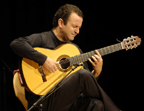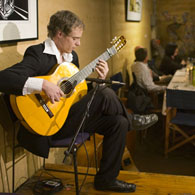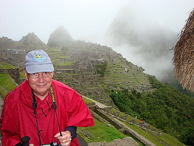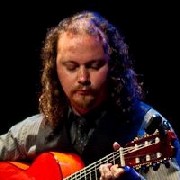Welcome to one of the most active flamenco sites on the Internet. Guests can read most posts but if you want to participate click here to register.
This site is dedicated to the memory of Paco de Lucía, Ron Mitchell, Guy Williams, Linda Elvira, Philip John Lee, Craig Eros, Ben Woods, David Serva and Tom Blackshear who went ahead of us.
We receive 12,200 visitors a month from 200 countries and 1.7 million page impressions a year. To advertise on this site please contact us.
|

|
|
early history of rondeñas
|
You are logged in as Guest
|
|
Users viewing this topic: none
|
|
Login  | |
|

   
BarkellWH
Posts: 3458
Joined: Jul. 12 2009
From: Washington, DC

|
 RE: early history of rondeñas (in reply to runner) RE: early history of rondeñas (in reply to runner)
|
|
|
quote:
I have long been a confirmed agnostic about any and all explanations of the origin of flamenco.
Agreed, except in the most general terms, such as, inter-alia, the Moorish, Sephardic, and Gypsy influence on the genre as we know it. It clearly did not begin with the 17th century fandangos and 18th century rondenas mentioned in a comment above, but when those forms were appropriated by and absorbed into the genre is anybody's guess. It certainly happened much later, after flamenco had become a recognized genre sometime in the mid to late 19th century.
What should not be forgotten is flamenco began as cante. It did not begin with guitar work, be it 17th century, 18th century, or otherwise. It began as cante, and the guitar was later incorporated into it as an accompanying instrument, and I imagine it was pretty crude accompaniment at the time (at least by today's standards).
But no, one cannot point to a definitive point in time or a particular set of circumstances and have that Eureka Moment and say, "Ah, so that was the origin of flamenco!"
Bill
_____________________________
And the end of the fight is a tombstone white,
With the name of the late deceased,
And the epitaph drear, "A fool lies here,
Who tried to hustle the East."
--Rudyard Kipling
|
|
|
|
REPORT THIS POST AS INAPPROPRIATE |
Date Mar. 24 2015 22:11:59
 |
|

   
Kevin
Posts: 294
Joined: Sep. 7 2008

|
 RE: early history of rondeñas (in reply to BarkellWH) RE: early history of rondeñas (in reply to BarkellWH)
|
|
|
quote:
What should not be forgotten is flamenco began as cante. It did not begin with guitar work, be it 17th century, 18th century, or otherwise. It began as cante, and the guitar was later incorporated into it as an accompanying instrument, and I imagine it was pretty crude accompaniment at the time (at least by today's standards).
Who said? There are good arguments against this including anecdotal material from early guitarists including Fernando el de Triana and singers as well.
quote:
But no, one cannot point to a definitive point in time or a particular set of circumstances and have that Eureka Moment and say, "Ah, so that was the origin of flamenco!"
Several writers are looking at 1880/81 as years in which flamenco began to coalesce as a form someone today could go back to and recognize. Not saying I agree but some of these arguments are more convincing than "Oh, flamenco started as just singing without accompaniment" which is also received, untested anecdotal information.
_____________________________
|
|
|
|
REPORT THIS POST AS INAPPROPRIATE |
Date Mar. 24 2015 22:20:48
 |
|

   
aloysius
Posts: 233
Joined: Apr. 7 2005
From: Adelaide, Australia

|
 RE: early history of rondeñas (in reply to Ricardo) RE: early history of rondeñas (in reply to Ricardo)
|
|
|
quote:
The earliest recordings I have heard are from Juan Gandulla accompanying cante, like 1909 or before... I personally find it hard to believe, as solid and standardized his toque is there, that what he is doing evolved out of a music form established less than 20 years prior. Doesn't make sense to my inner being...but that is just me and it is just conjecture of course.
There is a great recording by the Centro Andaluz de Flamenco called "Cilindros de Cera. Primeras grabaciones de Flamenco." It's 2 CDs of remastered wax cylinder recordings from 1890 - 1905. The earliest of these would be some 20 years before the first Juan Gandulla recordings. The guitar on these recordings is pretty crude, especially compared to the cante which feels already highly developed. I don't think this proves that cante existed for a long time without the guitar, but it maybe shows that the guitar was not considered such a big deal back then.
As for Marin, there are 2 distinct styles of playing in his method - his own descriptions of flamenco players at the time, which matches pretty closely the earliest recordings (a highly developed thumb, very simple arps with pi or pim etc) and his written out pieces which seem to be written for the classical guitarist. In some of the text he seems to be proposing a way forward for flamenco in terms of expanded arps, tremolo etc, but he certainly had a non-flamenco audience in mind, and I'd say his written pieces were tailored to that audience.
_____________________________
www.guitarsketches.com
|
|
|
|
REPORT THIS POST AS INAPPROPRIATE |
Date Mar. 25 2015 9:44:24
 |
|

   
BarkellWH
Posts: 3458
Joined: Jul. 12 2009
From: Washington, DC

|
 RE: early history of rondeñas (in reply to runner) RE: early history of rondeñas (in reply to runner)
|
|
|
quote:
There is a wonderful quote by Ortega y Gasset that says: "In the great hour of the decline of the genre...the opportunity of achieving the perfect work is excellent...when accumulated experience has utterly refined the artistic sensitivity."
I first read Jose Ortega y Gasset while at university decades ago, and I was captivated by his writing and insights. Ortega y Gasset's seminal work, "La Rebelion de las Masas" ("The Revolt of the Masses"), published in 1930, has initially fooled many first-time readers by its title. Contrary to the title's implication, that it is a work extolling the masses coming to power, it is exactly the opposite. It laments the deadening, lowest common denominator effect on everything, from art, music, and culture writ large, to thinking and politics, that the coming of "mass man" has wrought. He contrasts all that is noble in man with all that is common.
Ortega y Gasset was a liberal, elected to the Cortes in 1931 in the Republican government of Spain. But he was appalled by the "masses" then, and I'm sure he would be today as well. And he defined "mass man" widely as being not only the lower class of society, but the complacent, self-satisfied bourgeoisie as well. He defined European decadence of the '30s.
Here is a quote from the first chapter, "The Coming of the Masses."
"The characteristic of the hour is that the commonplace mind, knowing itself to be commonplace, has the assurance to proclaim the rights of the commonplace and to impose them wherever it will. As they say in the United States: 'to be different is to be indecent.' The mass crushes beneath it everything that is different, everything that is excellent, individual, qualified and select. Anybody who is not like everybody, who does not think like everybody, runs the risk of being eliminated."
The quote cited above could have been lifted from Nietzsche's "Thus Spoke Zarathustra," but then Nietzsche, with his wonderful insights and aphorisms, railed as well against the common mass attempting to bring anyone with noble thoughts, ability, and insights down to the lowest common denominator.
I have always remembered one of Nietszche's aphorism from his work "The Joyful Wisdom," one that easily could have been written by Ortega y Gasset:
"Look, look, he runs away from men. They follow him, however, because he runs before them. They are a gregarious lot!"
I still have my original copy of "The Revolt of the Masses," and I see how it remains relevant today.
Cheers,
Bill
_____________________________
And the end of the fight is a tombstone white,
With the name of the late deceased,
And the epitaph drear, "A fool lies here,
Who tried to hustle the East."
--Rudyard Kipling
|
|
|
|
REPORT THIS POST AS INAPPROPRIATE |
Date Mar. 25 2015 13:18:33
 |
|
 New Messages New Messages |
 No New Messages No New Messages |
 Hot Topic w/ New Messages Hot Topic w/ New Messages |
 Hot Topic w/o New Messages Hot Topic w/o New Messages |
 Locked w/ New Messages Locked w/ New Messages |
 Locked w/o New Messages Locked w/o New Messages |
|
 Post New Thread
Post New Thread
 Reply to Message
Reply to Message
 Post New Poll
Post New Poll
 Submit Vote
Submit Vote
 Delete My Own Post
Delete My Own Post
 Delete My Own Thread
Delete My Own Thread
 Rate Posts
Rate Posts
|
|
|
Forum Software powered by ASP Playground Advanced Edition 2.0.5
Copyright © 2000 - 2003 ASPPlayground.NET |
0.09375 secs.
|


 Printable Version
Printable Version











 New Messages
New Messages No New Messages
No New Messages Hot Topic w/ New Messages
Hot Topic w/ New Messages Hot Topic w/o New Messages
Hot Topic w/o New Messages Locked w/ New Messages
Locked w/ New Messages Locked w/o New Messages
Locked w/o New Messages Post New Thread
Post New Thread